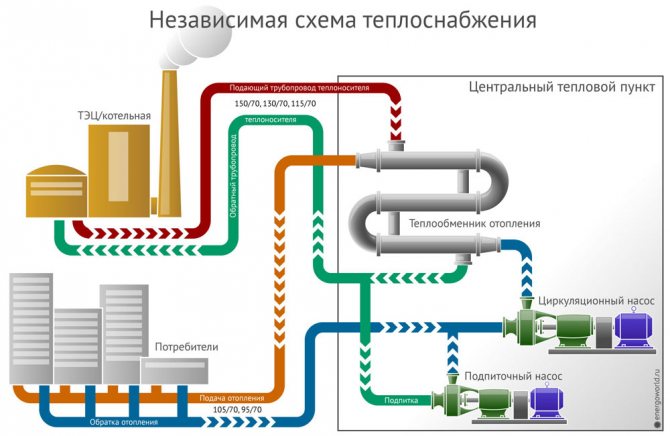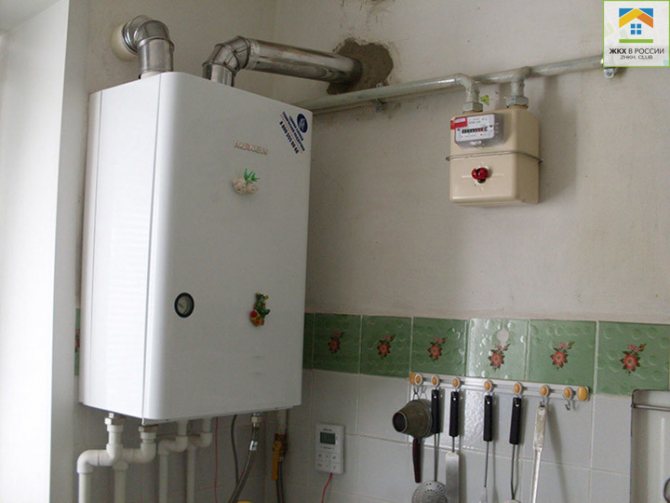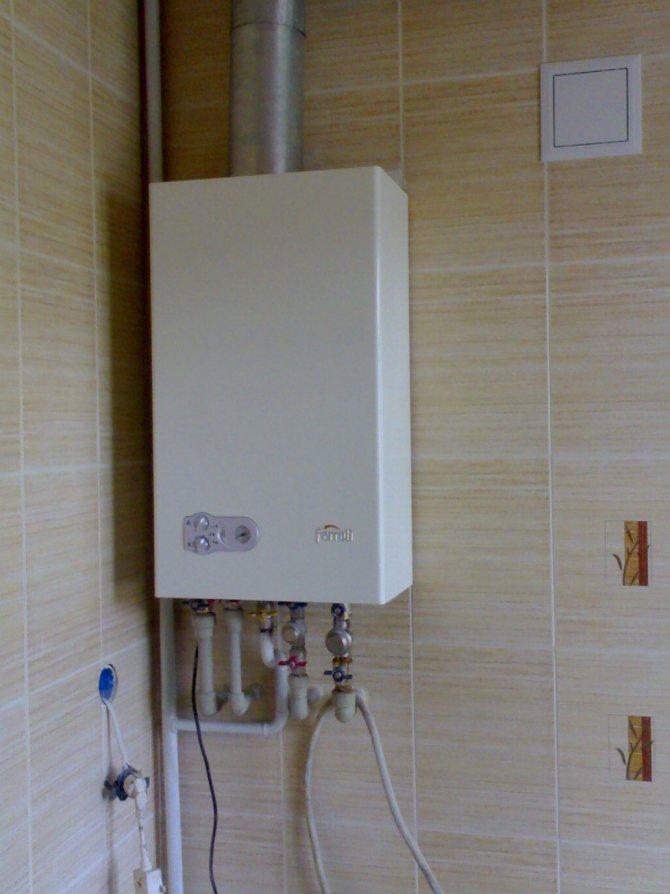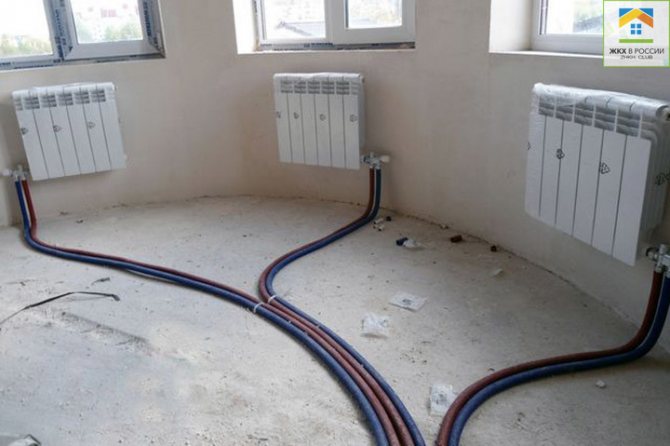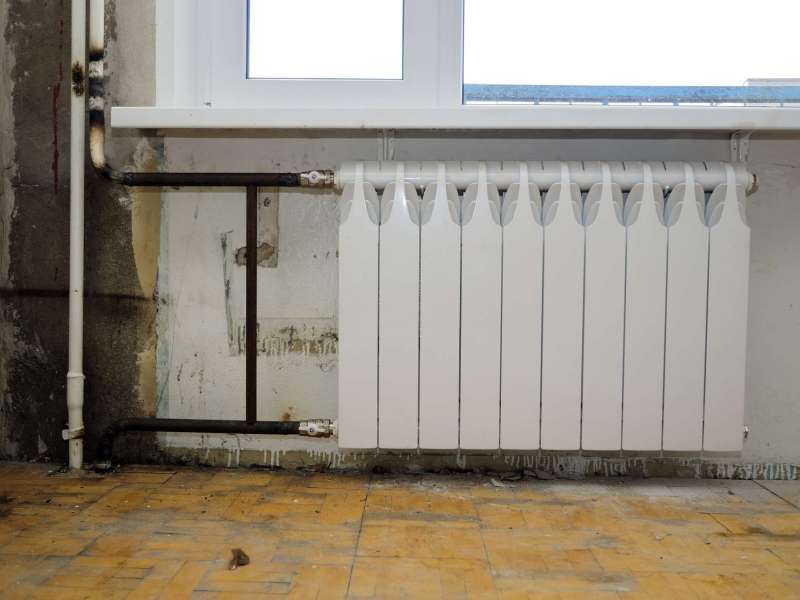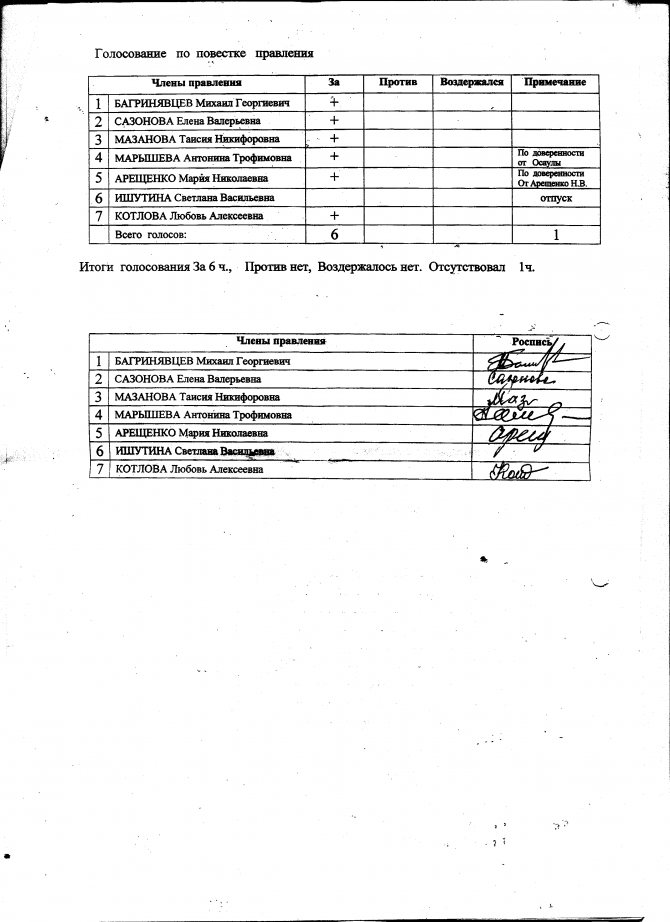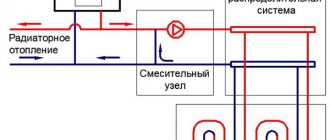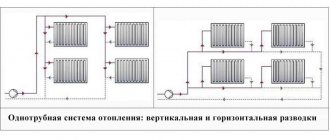What the legislation testifies
By all the rules, the possibility of switching to individual heating in a high-rise building is not prohibited.

But, in order to have no complaints against the tenant who has rejected the central heating, it is necessary to resolve a number of legal issues:
- The owner of the apartment needs to draw up a written statement about the upcoming redevelopment in the heating system;
- Prepare a registration certificate for a dwelling (apartment). It is the option that the owner receives after purchasing it. Since it is on it that they will judge the possibility of switching to heating in an autonomous mode;
- Be sure to have a certificate of ownership;
- Prepare a project for reorganization;
- Obtain written consent from both adults living together with the owner and all neighbors in the entrance to the possibility of redeveloping the heating;
- Obtain consent to exit from the centralized heating of the apartment from the organization that is responsible for the preservation of architectural monuments. If a refusal is issued from this organization, then it makes no sense to apply to other institutions;
- In cases where the owner of a dwelling in an apartment building is going to connect individual gas heating, then a permit from the gas service will also be required;
- In addition, the entire list of documents listed above with all approvals will need to be transferred to the fire brigade. They must fully study it and also give their consent.
Only upon obtaining permits from all instances can we talk about the rejection of centralized heating in an apartment building.
Implementation of the project
Returning to thoughts on how to abandon central heating, you can see that dismantling is carried out only after obtaining permission. You can cut old batteries yourself, but in order to avoid emergencies, it is better to have the dismantling carried out by specialists in this field. After eliminating the old supply system, you should immediately proceed with the installation of autonomous heating.
To know how to make your own heating in an apartment according to all the rules, you can familiarize yourself with the following points:
- Choosing a wall-mounted boiler for autonomous heating, it should be located above the level of the radiators. This will help in the formation of the natural circulation of the stream.
- For your heating, you must provide a forced circulation flow. This requires a circulation pump or boiler with built-in circulation elements.
- Any type of autonomous heating must comply with the law. This means that boilers must have the necessary safety system and a closed combustion chamber.
- Aluminum radiators are much more suitable for "their" heating system, because these types are more reliable and have better heat transfer. Plastic pipes are better suited for piping systems.
- The operational type of wiring should be chosen based on the apartment features.
Now, if the question arises whether it is possible to refuse heating in the apartment, the answer will not be difficult. At the same time, it is still worth thinking very well before starting this difficult process. Surely you will have to face neighbors who do not want to endure the inconvenience associated with the installation of the internal heating network.
Collecting the necessary documents and dismantling the batteries are not all the moments that an apartment owner must go through when he wants to disconnect his home from central heating. The costs of all these items separately do not cost much, such as disconnecting the heating riser, the cost of which does not exceed 500 rubles, but the total expense can "result" in a significant amount to the owner. You should not be upset about this, these expenses are one-time and the savings will please you more in the future.
Why is it necessary to agree on a new project of the heating system?
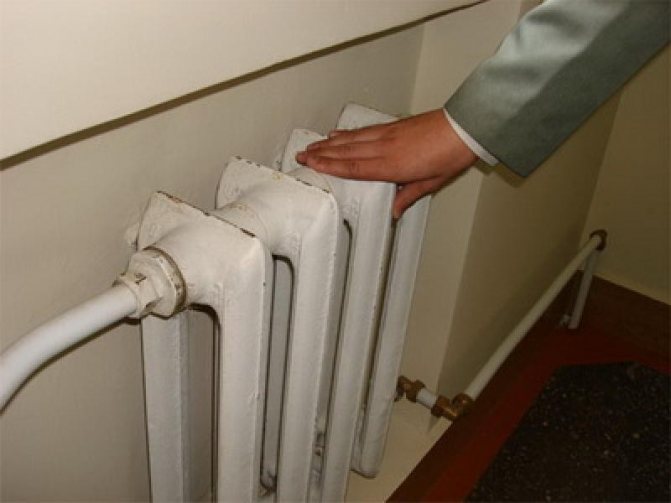

No organization will give permission to switch to individual heating without its project. It will not be possible to draw up a project on an independent basis and without an engineering education. It is best to contact a specialized institution for help.
The project must meet the following requirements:
- Show the role of a certain area (apartment) in the general heating system of the house (when switching to an individual one);
- Possibility of equipping an apartment with a heating boiler in terms of fire safety;
- Calculations for the residual elements of central heating (sun beds and risers), for which you will have to pay in the general order, despite the transition;
- Calculations of a thermohydraulic nature.
Only if all of the above calculations will fit into the permissible norms, you can give the finished project for the approval procedure. If, according to the norms, the prepared document does not correspond, then the individual will be refused.
Actions of an individual to stop payments for central heating
Having received permission from the relevant organizations to disconnect the apartment from central heating, and after completing all the work on re-equipping the system, it is necessary to submit a package of documents to the heating networks so that the subscriber is excluded from the register of central heating users. Otherwise, you will have to pay for heating in the operating mode.


The package of documents must include the following:
- A copy of the design documentation for the refurbishment of the apartment.
- A copy of the act of the relevant commission confirming the acceptance of the heating system.
You should also take into account additional regulatory documents that each region may put forward on an individual basis.
The absence of one of the documents in the package provided entitles the organization supplying heat to apartments to make accruals in the prescribed manner.
Is it possible to refuse central heating for residents of the entire apartment building?


Nowadays it is far from uncommon when residents in an apartment building have a desire to turn off centralized heating. Of course, it is easier for higher organizations to meet when this is the opinion of the majority, and not of one individual.
But you still need to know about the pitfalls that you can face. Otherwise, the refusal of the opportunity to switch to heating in an autonomous mode is provided to everyone who applies.
- It is necessary to hold an unscheduled meeting of all the owners in the apartment building and resolve the issue by voting on the possibility of all abandoning central heating. The decision must be necessarily recorded;
- The next step should be to draw up an application with a request to turn off the central heating in an apartment building, signed by all apartment owners;
- The minutes with the decision of the meeting and the application are forwarded to the local self-government body, under which a commission was created to coordinate this issue. She has the right to refuse the owners of residential premises if the introduction of an autonomous mode will cause a malfunction in the work of the microdistrict heat supply.And in those cases when the work of electric and gas mains does not provide for an increase in the load;
- If the decision is positive, the commission must issue the responsible representative with a list of institutions, the technical conditions of which must be observed when drawing up the project;
- The resulting specifications should be transferred to the drafting organization;
- The completed project must be approved by each institution from the following list:
- an energy company;
- heating network;
- gorgaz;
- housing organization;
- the architectural department.
- After agreeing on the project, it must be transferred to a licensed organization that will be responsible for carrying out the work;
- After the redevelopment work is completed, they must be accepted by all the organizations listed above.
Only by joint efforts, having carried out this huge work on redevelopment of the heating system, it will be possible to save your budget in a real, and most importantly, legal way.
Refusal of centralized heating of a dwelling located in an apartment building
Matiyashchuk Svetlana Vladimirovna, Candidate of Legal Sciences, Head of the Department of Civil Law of the Siberian Criminal Procedure Code,
Refusal of centralized heating of a dwelling located in an apartment building is not an easy procedure. Some experts believe that when switching to autonomous heat supply for at least one apartment in an apartment building, significant damage is caused to the entire heating system, in particular, the temperature in the adjacent rooms decreases. In addition, the hydraulic regime in the in-house heat supply system is violated and, as a result, the heat balance of the entire residential building. In this regard, a citizen who uses energy for household consumption is not entitled to refuse centralized heating of an apartment without the appropriate permission of an administrative body (Article 26 of the Housing Code of the Russian Federation).
Other experts base their opinion on the fact that Article 546 of the Civil Code of the Russian Federation is a special norm and therefore a household consumer under a heat supply contract has the right to withdraw from the contract at any time without explaining the reasons, having notified the heat supply organization of his intention in writing, and subject to full payment of the consumed heat energy for heating needs.
To resolve this issue, it is necessary to refer to the main provisions governing both the relationship with the supply of heat energy to consumers and the procedure for reorganizing residential premises (Chapter 4 of the RF LC).
The main source regulating heat supply relations is the Civil Code of the Russian Federation (paragraph 6 of Chapter 30), to which, with some changes, the provisions contained in the 1981 Regulations for the Use of Electric and Thermal Energy, which have expired, were transferred. However, it would be a mistake to believe that the norms borrowed from Soviet legislation are fully acceptable for the regulation of relations in the sphere of supplying household consumers with thermal energy in the current economic conditions. In the planned Soviet economy, autonomous heat supply practically did not develop, since it did not correspond to the state ideology. Preference was given to centralized heating facilities serving entire cities and other settlements. In addition, the development of autonomous heat supply was significantly hampered by the state policy aimed at establishing lower tariffs (prices) for heating. Therefore, there have never been questions about the abandonment of centralized heating and, accordingly, they were not regulated by law.
Currently, autonomous heating systems are increasingly used for heating residential buildings. There are several reasons for this trend.Firstly, when using autonomous systems, the solution of all issues related to construction is greatly simplified, in particular, the possibility of quick installation and commissioning of heating systems appears. It is also important that the initial costs for an autonomous heating system are significantly lower compared to a centralized one, since expensive heating networks are not required.
Secondly, the cost of operating autonomous heat supply systems is more than offset by the rational use of heat. After all, the volume of fuel consumption is reduced due to more accurate regulation of heat supply and the absence of its losses in heating networks. It is estimated that 40 to 60% of the heat generated for heating needs is now lost in district heating systems.
Indeed, autonomous heating can become one of the effective areas of housing and communal reform in Russia. At the same time, I would like to note that there are two types of autonomous heating: apartment heating, which the author analyzes in detail and in detail in this article, and autonomous heating of an apartment building. Depending on the type of autonomous heating, the approval procedure and the basis for the installation of autonomous heating differ.
Apartment heating should be understood as the decentralized individual provision of an individual apartment in an apartment building with heat and hot water (the system itself includes a heating boiler, heating devices, air supply and smoke removal systems.). Autonomous heating of an apartment building - decentralized provision of an apartment building with heat and hot water (the system assumes the presence of an autonomous boiler room).
Since 1999, the Gosstroy of Russia has been conducting an experiment on the construction and operation of multi-storey buildings with apartment heating. Houses with a similar heat supply system have already been built in Smolensk, Serpukhov, Bryansk, St. Petersburg, Yekaterinburg, Kaliningrad, Nizhny Novgorod and other cities of Russia. Based on the results of the experience of apartment heating, the corresponding SNiPs have been developed.
Apartment heating is widely developed in Europe. For example, in Italy, individual heating is provided about 20 million residential premises, incl. about 14 million apartments.
The undoubted advantages of apartment heating should also include:
- for citizens living in a residential building, the cost of utilities (for heat supply and hot water supply for a family of 4 people, compared to a centralized system, decreases almost 6 times, and taking into account subsidies - 15 times. The consumer gets the opportunity to achieve maximum thermal comfort, and he determines the level of his own supply of heat and hot water; the problem of interruptions in heat and hot water for technical, organizational and seasonal reasons is eliminated (according to the operating experience from 1997 to 1999 in Smolensk there are more than 800 apartments with apartment heating in buildings of various storeys) ;
- money is saved for the executive authorities due to the lack of heating plants, heat points, the problem of accounting and payment for heat energy is eliminated; the provision of heat and hot water is shifted from the state to the end consumer - the citizen; As a result, these factors reduce the costs of budgets of different levels for fuel and energy supply.
The procedure for terminating a heat supply agreement is regulated by article. 546 of the Civil Code of the Russian Federation. Paragraph 1 of paragraph 1 of this article considers the case when the subscriber of the heat supply contract is a citizen who uses energy for household consumption.He has the right to terminate the contract unilaterally, subject to notification of the heat supply organization and full payment of the used energy. At the same time, it should be borne in mind that from a technical point of view, abandoning centralized heating is at least a process for replacing and transferring engineering networks and equipment that require changes to the technical passport. In accordance with article 25 of the Housing Code of the Russian Federation, such actions are referred to as the reorganization of a residential premises (residential building, apartment, room), the procedure for which is regulated both by Chapter 4 of the RF Housing Code and by the provisions of the RF Town Planning Code on the reconstruction of an internal heating system (that is, obtaining a reconstruction project , permission for reconstruction, act of commissioning, etc.).
I would also like to emphasize that when installing heating equipment in a residential building, its quality characteristics must be confirmed by a sanitary and epidemiological conclusion, a fire certificate, a Rostekhnadzor permit and a certificate of conformity.
The reorganization of the premises is carried out in agreement with the local government body on the territory of which the residential premises are located. In addition, the in-house heat supply system of an apartment building is part of the common property of such a house, and reducing its size, including by reconstructing the heating system by transferring risers, radiators, etc. at least in one apartment, it is possible only with the consent of all owners of premises in an apartment building (part 3 of article 36 of the RF LC).
Only the owner of the relevant premises or a person authorized by him (for example, tenants and other users of residential premises who are not the owners, but authorized by the owner to perform such actions) can take the initiative to carry out the conversion of the premises.
The applicant must apply to the local government with an application for the reorganization of the living quarters. The form of such an application was approved by the Decree of the Government of the Russian Federation dated April 28, 2005 No. 266 "On approval of the application form for the reconstruction and (or) redevelopment of the living quarters and the form of the document confirming the adoption of the decision on the approval of the reconstruction and (or) redevelopment of the living quarters." Simultaneously with this application, the documents specified in Article 26 of the RF LC are submitted, including the prepared and executed project and technical documentation for the installation of an autonomous heat supply system (an autonomous heat supply source can be electric, gas, etc.). This project is carried out by an organization that has a certificate of admission to perform this type of work, which is issued by self-regulatory organizations in the construction industry. Its contents include the following sections:
- calculation of the effect of turning off heating devices on the heating system of a residential building as a whole;
- calculation of the residual heat consumption from the risers of the heating system;
- expert opinion on the thermal-hydraulic regime of the building after the transfer of the living quarters to individual heating.
The body carrying out the approval is not entitled to demand from the applicant other documents, in addition to those specified in Article 26 of the LC RF, documents.
The decision to approve or refuse to approve must be made by the authorized body no later than 45 calendar days from the date the applicant submits the necessary documents. If a decision on approval is made, the applicant is issued a document confirming this decision, which serves as a legal basis for the implementation of actions to replace and transfer utility networks and equipment, taking into account the project submitted by the applicant for approval.In order not to violate the rights and legitimate interests of heat consumers, as a rule, such work should be carried out during the inter-heating period.
Refusal to approve the reorganization of the premises is possible only in three cases, which are defined in article 27 of the RF LC, and can be appealed in court.
In turn, any actions for the replacement and transfer of engineering heating networks and equipment, which were carried out in the absence of appropriate approval or in violation of the reconstruction project submitted for approval, are called unauthorized reorganization.
The current legislation provides for a number of unfavorable legal consequences for persons who have arbitrarily carried out the reconstruction of living quarters.
So, in accordance with Article 7.21 of the Code of Administrative Offenses of the Russian Federation "Violation of the rules for the use of residential premises" unauthorized re-equipment of residential premises (residential buildings, apartments, rooms) entails the imposition of an administrative fine on citizens in the amount of one to one and a half thousand rubles. At the same time, his non-payment within 30 days may result in the imposition of an administrative fine in double the amount of the unpaid fine or administrative arrest for up to 15 days.
In addition, in addition to bringing the guilty person to administrative responsibility, a citizen who arbitrarily remodeled a dwelling is obliged to bring this dwelling back to its previous state within a reasonable time.
In the event that a citizen, within a reasonable time and in the manner determined by the local self-government body, has not brought the dwelling to its previous state, then the said body applies to the court with a corresponding claim.
If this citizen is the owner of the dwelling, then claims are made to sell the dwelling at a public auction with the payment to the owner of the proceeds from the sale, minus the costs of enforcing the court decision, and with the imposition of duties on bringing the dwelling back to its previous state on the new owner.
If we are talking about an employer under a social employment contract, then claims are made to terminate the social employment contract.
Experts note that in certain cases, actions to unauthorized transition from central heating to autonomous heat supply systems can be qualified as arbitrariness. And depending on the severity of the offense, the guilty person can be brought to administrative (Article 19 of the Code of Administrative Offenses of the Russian Federation) or criminal liability (Article 330 of the Criminal Code of the Russian Federation).
In conclusion, I would like to once again draw attention to the fact that the norms of the current legislation regulate in sufficient detail the procedure for refusing centralized heating of a residential premises, as well as the legal consequences of non-compliance by consumers with the requirements established by law for its implementation.
Digest: In district heating systems, 40 to 60% of heat is lost
SZ RF. 2005. No. 19. Art. 1812; 3 39. Art. 3957.
You should know!
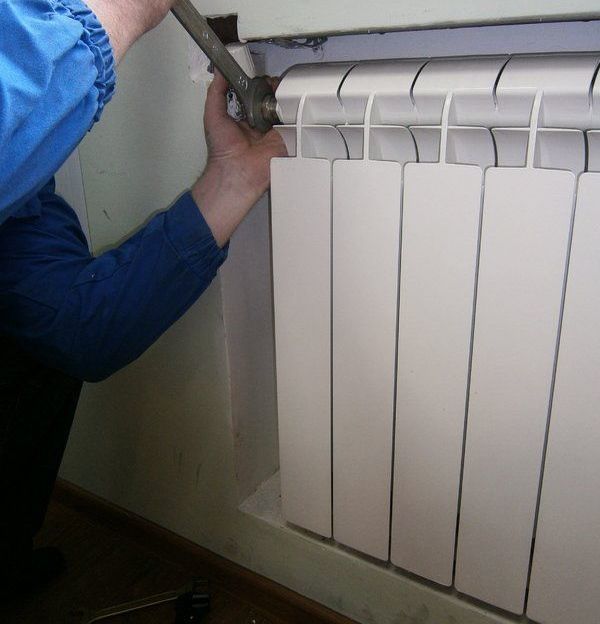

When planning to turn off centralized heating in an apartment building, you should always remember the following points:
- Discuss this opportunity with your neighbors. If there are supporters who want to make the same reconstruction in their own apartments, it will become much easier to resolve issues;
- Collect all the required documents;
- If in order to obtain permission you have to pay for the reconstruction of the heating main, think about whether the skin is worth the candle;
- Obtain a work permit;
- Purchase all the necessary equipment;
- Contact a special organization for help in carrying out the work;
- Please note that according to the adopted amendments from 2011, the transition to individual heating for one particular apartment has become almost impossible.Even when applying to the courts, not all cases are won by apartment owners. Therefore, it is best to turn off centralized heating at the request of the entire entrance or apartment building;
- Remember that for unauthorized disconnection from centralized heating, an individual is subject to a penalty established by law. In addition, all costs incurred for the renewal of district heating are also borne by the natural person who caused the damage;
- Any decision made should be good not only for one person, but also for those around him.
So, summing up all of the above, it is safe to say that it is quite possible for residents in an apartment building to refuse central heating, but only this process should proceed without violating the law.
Objections
Your refusal to use central heating will in no way delight the representatives of housing organizations. In fact, he will be hindered by all means.
Do not rush to accuse officials of shortsightedness and greed: there are good enough reasons for this.
- If you stop paying for heat, this will mean a reduction in receipts not only for the salaries of housing and utility workers and heating networks, but also for the repair of highways and valves. Meanwhile, its quantity will not decrease from the disconnection of one apartment.
- The flow of money to the city and federal budgets will also decrease... Part of the money you contribute for heat and transferred to the accounts of the relevant organizations is paid by them in the form of taxes and is spent on the construction and maintenance of roads, kindergartens, schools, on street lighting and the fight against crime, on the payment of pensions and benefits.


City services are dependent on tax revenue for their functioning.
- It will be difficult for a housing organization that does not have access to your home to control the absence of unauthorized connections... Risers from your apartment won't go anywhere; you will have a great opportunity to stop paying for heating, but use it.
However: on the upper floors in houses with lower bottling, the problem is solved by installing a lintel on the floor below.
- Due to the inevitable leakage of thermal energy through walls and concrete floors, you will be able to use the heat that neighbors pay for... There is no escaping physical laws: where there is a temperature difference, a heat flux inevitably arises there.
- The notorious temperature difference will lead, among other things, to accelerated destruction of load-bearing structures, peeling of plaster and wallpaper.
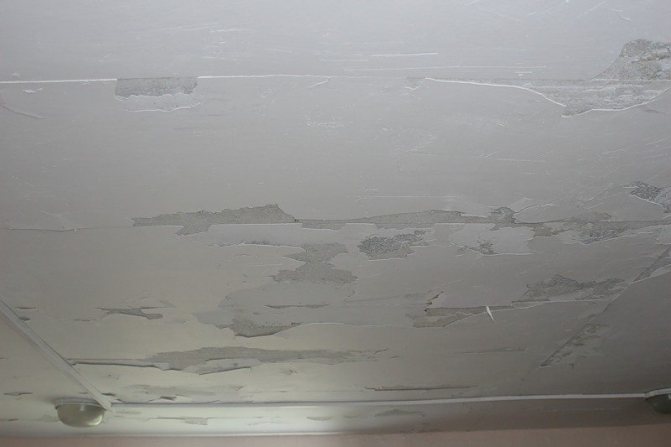

This happens with significant temperature differences between apartments.
- In unheated or poorly heated rooms, freezing of the walls is inevitable with the concomitant manifestation of fungus and condensation... The latter will quickly appear as a wet spot on the ceiling of the neighbors below.
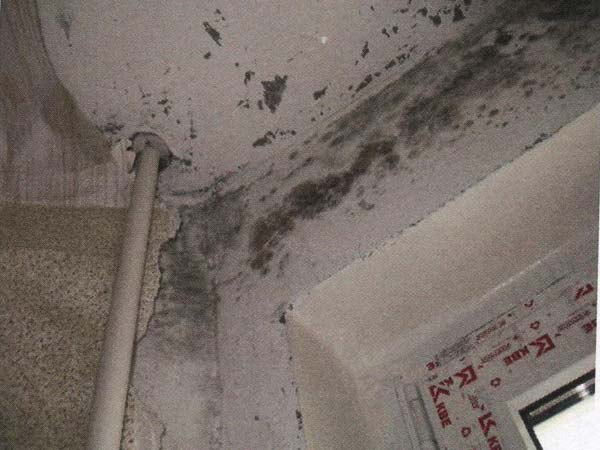

The reason for freezing is the low temperature in the apartment.
- Moreover: the lack of heating can lead to defrosting of the water supply lines.... While they are looking for the owner of the apartment, the tenants up and down the riser enjoy the lack of water.
The price of unauthorized disconnection from the central heating system is a fine and restoration of the original configuration of the heating system at its own expense.
Required package of documents
By law, any citizen of the country has the right to refuse the services of the heating network, but this will require the following documents:
- Free-form statement.
- Registration certificate for the apartment.
- Documents confirming ownership.
- Consent of all adult residents of the apartment.
- The conclusion of the commission.
This list must be accompanied by a new heating system design drawn up and certified by authorized specialists. Sometimes the chosen method of heating the home can become a reason for failure, so it is better to weigh everything carefully and consult with the engineers of the heating network.
Tips & Tricks
In the process of solving the question of how to turn off the heating in an apartment building, the following points should be taken into account:
- The best question is how to abandon central heating and bring it up for discussion with all neighbors. If there are those who want to carry out a similar procedure in their apartment, then the issue will be resolved easier.
- It is important to collect the entire package of documents, the absence of even one of them may cause the refusal of one of the higher organizations.
- It is mandatory to obtain permission to perform the relevant work.
- It is better to involve a specialized company for their implementation.
- The necessary equipment is purchased in full.
When deciding to disconnect from the heating system, it is important to remember that unauthorized actions can lead to penalties. In addition, you need to understand that you cannot get benefits at the expense of the suffering of others.

